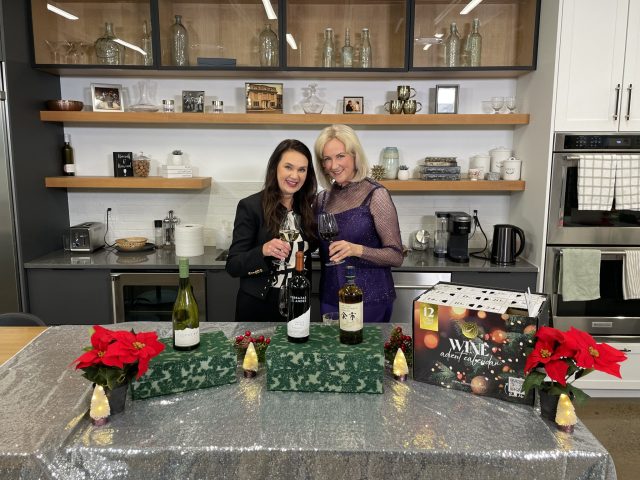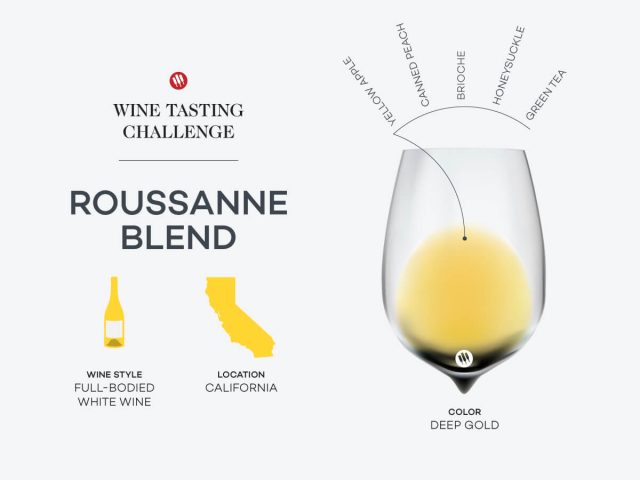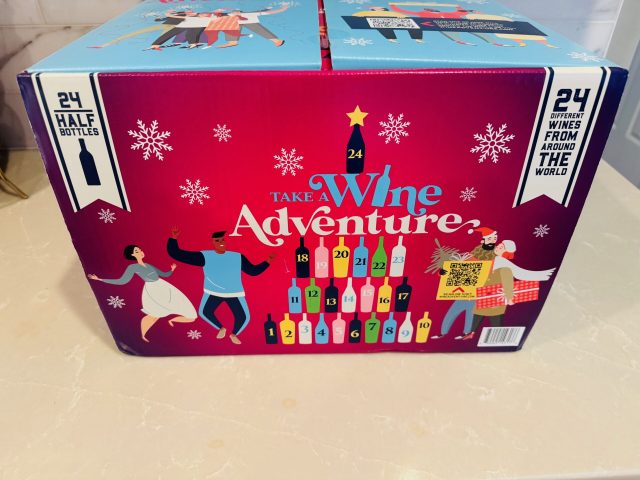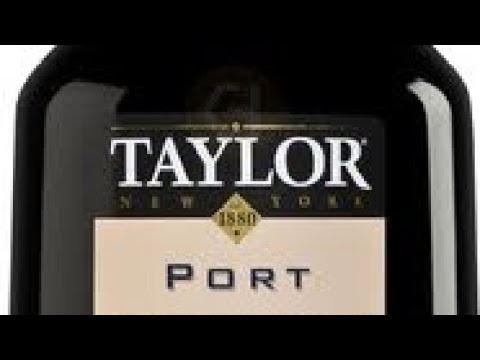A Visit to Mátra Winemakers
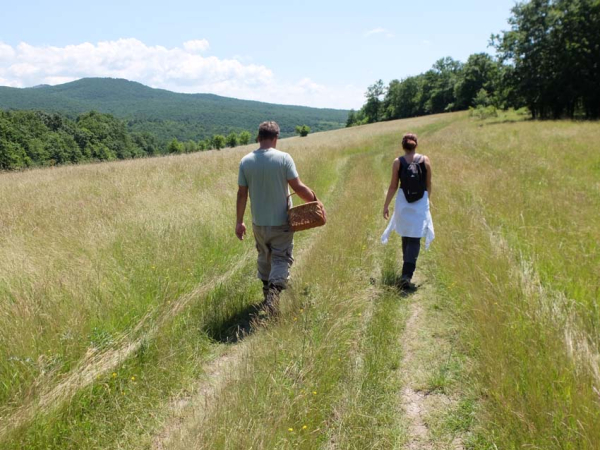
I’m used to look for mushromms in the Loire but I limited myself to mostly two types there, boletos and Hedgehog mushrooms but Andras and Kinga are very knoledgeable and pick a wide range, discerning cleverly between the bad, the not-so-good and the good.
We stopped for a short visit at Centurio Sz?l?birtok (winery) which is run by Balázs Ludányi (pictured here). This is a family winery and he started it in 2008, the total surface is 4 hectares, with 3.6 in production and the rest just planted. He also plans to replant forgotten varieties like Laska. Balazs was also present during that memorable tasting evening (scroll down to 9th picture) we attended a few years ago in Szentesi’s cellar in Budaörs.
__ 1.84 Feher (means white) 2022. A blend with all the white varieties (5 of them) that year because very low volumes. 5000 bottles total. Spontaneous fermentation. 13,5 %. Full mouthed
__ Fáy-Domb 2018, Hárslevelü. For the picking he uses a team of 5 to 6 people. This wine is some kind of late harvest, picked end of october. 15%. Only free run juice, 24-hour skin co,ntact (I saw the color was darker here). Sold out. Interesting bitterness edge.
__ Late harvest 2011, made from Muscat Blanc à Petits Grains, 140 grams redidual sugar. Last bottle [0.5 liter] here (sold out). Super nice sweet wine. Sweet spîces aromas, gorgeous color. They picked withered berries, there was no botrytis at all because of the dry weather.
__ Rosé 2022, made from Cabernet Franc, this was the 1st picking of the vintage, 250 bottles total (sold out).
__ Diós 2022, Sz?retlen Kékfrankos (sample from barrel). 0,8 hectare plot, 2000 bottles, 3 or 4 grams residual sugar, some so2 added. Malolactic completed. Low sulfur in general here. He plans to bottle that next september.
__ Liberty 2022, sample wine, still in élevage. Cabernet Franc from two parcels plus a bit of Laska (2 %) and a bit of Kékfrankos. 14 % this year because of the weather conditions. Nice touch on the palate, like tissue paper. Some astringency still, but tannins pretty well under control.
__ Liberty 2021, 15 %, blend of 59 % Kékfrankos, 34 % Cabernet Franc, 6 % Pannon Frankos and 1 % Laska. Deep fruit, very straight and clean.
There was plenty of cooking treats during this weekend and Andras and particularly Kinga did a terrific job. I was impressed by the food they cooked in these traditional Bogrács pots, which are another reminder of the nomadic origins of the Hungarian people. We had two wonderful dishes made in there, a fish soup (made me yearn for more real fish soup like this at home) and gulash with roe deer, all that with great side ingredients and village-sourced paprika… These Bogrács remind me the traditional cast iron chaudrons or cauldrons that used to hang in the fireplace of every French farm. Bogrács are easily found in DIY supermarkets in Hungary or on large vegetable markets. If you check this Bogrács page enameled pots on OBI you’ll find many models and volumes (for the prices in Forints, 1000 Forints = 2,7 €), the one Andras and Kinga use is a 14 liter, really already a good size. You’ll find these pots on Amazon but they’re way more expensive.
Here in the garden we tasted also the wines of Mark, a winemaker who couldn’t join us that day :
__ Szignarovits-Maka, Borsos “N” 2020, a Kekfrankos “kenmentes” which means without sulfites. Quite acidic red.
__ Szignarovits-Maka, Furmint 2021, dry white, 14,5 %. Nicely structured Furmint, not feeling hot in spite of the high alcohol. But generous feel of course.
__ Centurio Összetett 2022, a blend of Kékfrankos and Cabernet Franc
That’s when we exchanged with the old lady neighbor Kati, who was out tending her garden as the heat of the day was leaving place to a cooler evening. She is 89 and her vegetable garden
is so well kept, with also a few fruit trees and a row of vines. She told her a bit about her life, her mother died in 1943 and her father was taken away by the Soviets to Odessa in 1945 (as slave labor like hundreds of thousands of Hungarians) and he never came back, dying there. She was married at 15 and was in charge of the farm, but with socialism taking hold of the country after WW2 life was tough, everything they produced was taken away by the communist system and on top of that they were forced to work for the local coperative farm. Very miserable time indeed [only years later did the regime changed course, becoming known as the lightest type of communist regime].
She showed us where the grapes were pressed, you can see a manual crusher in the background with a few other tools, very tiny room but they made their own wine back in these years. This country had indeed a very popular wine culture in every village, and I’m confident it will bounce back…
Back in Andras & Kinga’s house :
__ Szentesi Tihanyi Kék 2019, from a narrow-body 50-cl bottle, one of these resurrected varieties by Jozsef Szentesi. Nice peppery notes, smooth, peony notes also, very subtle wine. Regrafted over Rheinrizling. Very feminine, lovely wine !
__ Csóka 2022 by András Kovács, also an ancien local variety also called Csókasz?l?, András planted a few rows recently. Vat sample, his total volume is 60 liters, still very low volume. Some so2 added at crushing and at racking. 40 total. These varieties are very interesting to come through, there are very little replanted still to this day. Csóka is also the Hungarian name of a big black bird, and this bird which looks like a crow happens to be named Choucas in French, a rare occurence of a Hungarian name being similar to one in a Romance language.
__ Laska 2022, yet another rare local variety, blended with some Syrah here. Also a vat sample. The color is evolved, in the mouth it’s super smooth, with something like salinity, and there’s definitely fruit notes. When still haging, the grapes had low Ph, high acid and András decided to pick early. He made a blend to have enough volume for a barrel. I’m sure this variety has a future. There’s a possibility you’ll find this cuvée in the near future in Drop Shop, the excellent wine shop/bar in Budapest.
__ Hainos Kék 2022 from András Kovács again, another mysterious local variety with big curved branches that break easily. There’s a story saying that Huns used to grow these vines. The clusters are long and tight. Nice chalky mouth, balanced. Gets easy to dring, lovely ! Bottled a week before. András says there are notes of blueberries and violet, that’s right. Szentesi says that this variety yields volatile acid esily, so so2 has to be sprayed on the grapes in the tank to prevent problems.
__ Palya Cabernet Sauvignon 2021 by Balazs Palya who joined us for this memorable evening when we tasted both inside and outside. About this cuvée Balazs says that by mid september he was quite anxious, the Ph was low, with paprika notes which was not usual, so he decided to pick the 3rd week of september, the sugar level was 2015, it’s 13 %. This wine was bottled in august 2022, the wine was a bit tight then and needed a few months, like 4 months he thought. Malolactic took 8 months. Balazs does biodynamic farming and vinifies without so2.
__ Palya Kékfrankos 2022, 30 % went through barrel, 70 % in polypropylene tank, one year on lees, then bottled (by gravity, 400 bottles/day from 7am to 8 pm). Picked sept 2021, bottled sept 2022, on the market january 2023. At the beginning after bottling was oaky but this went away after a few months. No so2 at all (total under 20 mg), unfines, unfiltered.
